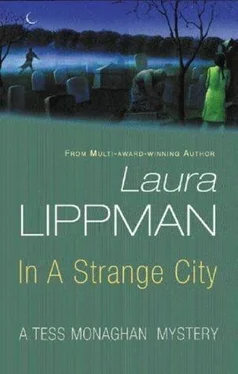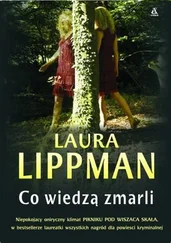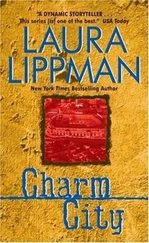“He’s a big fan of yours, too.” Tyner’s voice sharpened to its old acerbic bellow. “Why didn’t you tell me you were there that night? Why did you let me natter on about the murder in Kitty’s that day without sharing with me what you knew? I felt like a fool.”
Tess was so happy to have Tyner yelling at her again that she told the truth. “Because I knew you wouldn’t approve. I’m not sure I approve. At first, all I wanted to do was find the guy who tried to hire me and figure out if I should turn him over to Rainer and all those media jackals. But then it really got weird. It’s as if I have a client, but I don’t know who it is.”
She told him everything, glad to unburden herself, gladder still to have Tyner’s keen mind on her side. Crow was a more intuitive thinker-he picked up emotional currents that Tess missed-while Tyner was incisive and logical, interested primarily in facts. Like Whitney, he was disturbed by the attentions from Tess’s visitor. He also frowned when he heard about the brawl with Gretchen O’Brien.
“Two women, guns drawn, rolling around on the floor together,” he said. “It sounds like a bad porn film.”
“It sounds as if you know something about bad porn films,” Tess countered. “So what’s going on? A homicide, an assault, two burglaries, a sleazy private detective, and two mystery men-my secret friend and ”Mr. Kennedy‘ Assuming they’re not one and the same.“
Tyner was clearly struggling with himself. She knew him so well, she could see that he wanted her to drop the case, but he couldn’t shake his own fascination with it.
“The two burglaries-have you looked into those, tried to figure out what the connection is? You could drop by their homes, pretend to be-oh, a security expert who is making calls on burglary victims in hopes of selling them your burglarproofing service.”
Tess smiled. “I was going to hit them both on my way home tonight, but I hadn’t thought of a cover story yet. Maybe I’ll use yours.”
Silly to think she could ever have the last word with Tyner.
“You might as well,” he said. “Because it’s a sure bet you won’t come up with anything better.”
Bolton Hill is one of those Baltimore neighborhoods that becomes a religion for its residents. Outsiders had been predicting its fall for as long as Tess could remember. In fact, the rumors of its imminent demise predated her birth, for the riots of ‘68 had led many to despair about the city’s future. But those feverish partisans who chose to put up with Bolton Hill’s inner-city indignities-the car break-ins, the burglaries, the theft of ornamental iron and lawn furniture, the occasional mugging on one’s doorstep-were rewarded with some of the most spectacular real estate in Baltimore, within walking distance of the symphony, the opera, and the upper reaches of downtown. Crow still kept an apartment on Park Avenue, although Tess couldn’t remember the last time he had actually spent a night there.
Jerold Ensor’s house was stunning even by the neighborhood’s high standards, a huge town house on John Street, crammed with antique wonders. Or so it appeared from Tess’s vantage point in the foyer, where she had been asked to wait fifteen minutes ago by the housekeeper who had answered her insistent ring. It wasn’t clear if she was being made to wait or if she had been forgotten completely.
Left with nothing else to do, Tess stared at herself in a huge ornate mirror-a mirror that had hung, according to a three-by-five card pinned next to it, in the room where Francis Scott Key had died. She wondered how such a piece of trivia affected the value of an item. Would a mirror from the room where he had been born be worth more or less? How did one authenticate such claims? She recalled Fuzzy Iglehart dragging out those ersatz stadium seats and smiled. Sometimes, it seemed as if everyone had Antiques Roadshow fever, the conviction that some priceless item was in their possession, if only they knew what it was.
As the minutes passed, she thought less about the mirror and more about her face. She had been harsh and not a little smug in her assessment of Gretchen O’Brien last night. Tess had turned thirty-one last August, which was far more shocking than thirty. Thirty-one cemented the idea that the numbers kept going up. Yet she couldn’t get too panicky about the fine lines around her eyes and the parentheses at her mouth. If the choice was between smiling and having a smooth, lineless mask of a face, she’d choose to smile and laugh, thank you very much. Kitty had gotten to her early about the importance of sunscreen, and her skin was in pretty good shape for someone who rowed and ran. It helped, too, keeping a little flesh on her bones. Most women didn’t understand that.
But the hair-she heard her mother’s voice in her head, for Judith always referred to Tess’s hair as if it were an object apart from herself, a recalcitrant pet that Tess could not tame: The Hair-should she cut it off? Was it unseemly to have long hair after thirty? She sensed there were rules about such things, unwritten ones that other women knew but so far had refused to share with her.
“Miss Monaghan?”
Jerold Ensor was a tall, cadaverous man with bloodhound-droopy features. His face was so sad Tess wondered if she had missed the news about some large-scale tragedy-an assassination, a war, a natural disaster, the imminent departure of the Orioles for Washington. With that face, Ensor should have been an undertaker or at least a professional pallbearer.
But the effect was undercut by his voice, a high tenor popping with Baltimore vowel sounds that he couldn’t quite suppress, although he seemed to be trying.
“My housekeeper brought me your card, said you wanted to talk to me about security in the wake of the break-in here some months back. I hope this isn’t your way of trying to sell me something.”
Yes, I’m using Tyner’s plan, she told her sniping conscience. What of it?
“No, I don’t represent a company, if that’s what you fear. But I am trying to expand my business by helping businesses and private residences assess their security needs.” She was bullshitting, but, as it often happened, her bullshit caught her fancy. Maybe she should set herself up as a security consultant. That could provide a nice little revenue stream. “Because I’m still trying to break into this area, I’m not selling anything yet. I’m interviewing those who have already been victims to see what I can learn about what works and what doesn’t.”
“My story isn’t a particularly interesting one-”
“I wish you’d let me be the judge of that.”
He seemed to be looking not at her but past her, at the reflection of her back in the mirror. “Should we have a seat in the parlor?”
The parlor, as Ensor would have it, was one of the most overdecorated rooms into which Tess had ever ventured, overwhelming the eye. The walls teemed with framed paintings, while bric-a-brac sprang from every possible surface, toadstools in a forest. It was like falling inside a kaleidoscope; one was too close to the pieces to discern the larger pattern. Slowly, small surprising details began to shake out. An old revolving metal postcard rack stood in one corner, filled with antique views of Baltimore and Maryland. A cigar-store Indian kept vigil from another corner, and next to him-could it be?-an old-fashioned drinking fountain was attached to the wall.
“It works,” Ensor said, following her gaze. “I bought it from the school district when they redid the old Polytechnic and made it into the administration building. I was a Poly boy, and I admit to a sentimental-perhaps I should say egotistical-yen for anything from my own past. The postcard stand was in a store where my family stopped for ice cream on Sunday drives, and the cigar-store Indian stood in my own great-uncle’s shop. I’m a collector, but I collect things only I care about.”
Читать дальше












